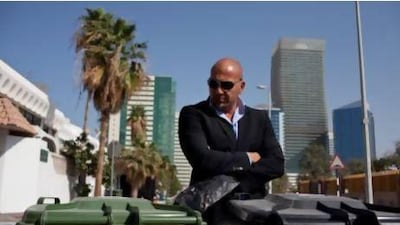ABU DHABI // Most capital residents who have green and black bins at their homes are unaware which one of them is for recycling.
Too often rubbish is not separated, making recycling difficult.
The Centre of Waste Management delivered recycling bins to about 14,100 homes in December last year.
The first 8,200 green (recycling) and black (general waste) bins were sent to 4,100 homes in Abu Dhabi. The second phase will cover almost 11,000 homes in about 830 residential complexes.
The centre is spreading its message extensively, holding seminars at schools and distributing instruction leaflets.
"Our officials distributed brochures to each home and demonstrated the meaning of green and black," said Nada Khamees, senior public awareness officer at the centre.
Saeed Mohammed, a retired Emirati who has lived in Al Za'ab, near Passport Road, for 36 years, said he had not been given any instructions on how to use the bins.
"I throw the waste in both green and black," he said. His bigger concern was the frequency with which rubbish was picked up. "They come regularly now," he said.
"I don't know anything about these rubbish bins and we did not receive any leaflet or educational papers from any department," said Umm Aamir, who lives off Muroor Road opposite Khalifa University.
She puts her rubbish in whichever bin is empty.
Maryam Ghauran Mohyyaa, an Indonesian maid who collects and dumps the rubbish for the family she works for,was unaware of any segregation requirements. Ms Mohyyaa lives in Old Mushrif, near the Abu Dhabi immigration department.
The centre says non-recyclable items, such as discarded food, cleaning sponges, cigarettes and general rubbish, should go into the 250-litre black bins. The green bins should have only glass bottles, cans, paper and plastic. All food or drink should be rinsed from the items.
The rubbish is taken to Al Mafraq waste management station and then to Al Dhafrah landfill. The recyclable material is sold on local and international markets.The centre aims to cut waste generation by 70 per cent by 2015.
John Schneider, a contracts specialist at the centre, said the number of bins depends on the local population of the area.
"We want residents to segregate the waste and they need to understand what waste goes to which bin," he said.
Some more responsible citizens are encouraging their neighbours.
Shamshuddin, who has been in the UAE for 38 years, said two women from thecentre came to his home with brochures.
They explained he should segregate his rubbish and put it in separate bins. "When I find others are not doing it properly and throwing garbage randomly I try to explain to them what the green and black colours mean, and how we have to separate at home then drop in bins," Shamshuddin said.
Ms Khamees said residents who had waste that would not fit in the bins should call 800 555 for a separate pickup.
"We deal with such waste as bulky waste," she said. "Instead of throwing things away illegally, they need to contact us."

